|
It
is very likely that nearly every one has been very nearly certain that
something that is interesting is interesting them...
30
July 2003 — Wednesday
§
Seabiscuit | Dir. Gary Ross, 2003 |
Universal | 140min | IMDb link
Every
fourth shot could have been cut (at least for anyone who's heard of
the great depression before) but Chris Cooper, the labor organizer in
Matewan (Sayles, 1987) who here plays the
horse's trainer, and William H. Macy as the hyper-loquacious radio man
are worth seeing. • Ebert
on Cooper: "Once again Chris Cooper shows himself as one of the
most uncannily effective actors in the movies. Here he seems old, pale
and a little worn out. ¶ In Adaptation,
only a year ago, he was a sunburned swamp rat. In John Sayles' Lone
Star he was a ruggedly handsome Texas sheriff. How does he make
these transformations? Here, with a few sure movements and a couple
of quiet words, he convinces us that what he doesn't know about horses
isn't worth knowing."

29 July 2003
— Tuesday
§
Edward Hirsch | "Wislawa Szymorska: Rapturous
Skeptic" and "Philip Larkin: Sour Majesty" | Responsive
Reading | Ann Arbor: U of Michigan P, 1999 | 102-114,
115-130
"Larkin
may have hated the Modernists, but he had more in common with them than
he supposed. He now takes his place in a line of reactionary twentieth-century
writers—from Yeats, Pound, and Eliot to D.H. Lawrence and Wyndham
Lewis—whose lives (and works) were fueled by repulsive right-wing
hatreds. But what was for an earlier generation a rising tide of democracy
and leveling modern values was for Larkin a flood that had already taken
place. He has just about drowned" (124).
28 July 2003
— Monday
§
Unfaithful | Dir. Adrian Lyne, 2002 | 124min
| DVD | IMDb link
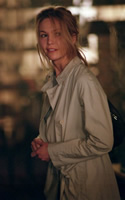
Diane Lane
(above looking a little like Cecilia Roth in All
About My Mother) and Richard Gere perform well in a low-key but
ultimately paranoid fantasy about excess desire that I'll be hard pressed
to remember six months from now.
27 July 2003
— Sunday
§
Times Literary Supplement
5232 | 11 July 2003
•
Stephen Burt | "Journal of the Trade" | Rev. of The
Poetry Anthology 1912-2002, edited by Joseph Parisi and Stephen
Young and Dear Editor: A History of Poetry in Letters:
The First Fifty Years 1912-1962 | 11
•
Matt Cartmill | "Mystery of the Missing Animals | Rev. of Life
on a Young Planet by Andrew H. Knoll | 12
•
J.C. on Baraka | 16
•
Penelope Murray | "Silent Words, Talking Pictures" | Rev.
of The Origins of Criticism: Literary Culture and
Poetic Theory in Classical Greece by Andrew Ford | 30
•
Liam Hudson | "In Your Dreams" | Rev. of three books on "social
dreaming" by or edited by W. Gordon Lawrence | 31
26 July 2003
— Saturday
§
Chris Marker Special
Section | Film Comment | July-August 2003
•
Paul Authur | "Kino-Eye: The Legacy of Soviet Cinema as Refracted
through Chris Marker's Always-Critical Vision" | 32-34
•
Min Lee | "Red Skies: Joining Forces with the Militant Collective
SLON" | 38-41
•
Michael Chaiken and Sam Diiorio | "Printed Matter: The Author behind
the Auteur: Pre-Marker Marker" | 42-43
•
Kent Jones | "Time Immemorial: Chris Marker's Maiden Voyage into
the Uncharted Waters of CD-ROM" | 46
§
Twilight of the Ice Nymphs | Dir. Guy Maddin, 1998
| 91min + Heart of the World | Dir. Guy Maddin,
2000 | 6min |
DVD | link
to Zeitgeist page for Twilight |
link to Artforum interview
with Maddin, mentioned here on 9
July.
Melodrama
meets constructivism in Heart
of the World, a hectic
but unerring
pastiche of early Soviet cinema. • Twilight
of the Ice Nymphs mostly fails along the axis of so-bad-it's-good
acting (the so-bad-it's-just-bad script doesn't help), but as a series
of eye-arresting stills set briefly in motion it often works.
25 July 2003
— Friday
§
Entr'acte | Dir. René Clair, 1924 |
22min | Included as a feature on À
Nous la Liberté | DVD |
Criterion 2002
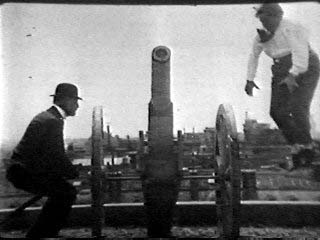
Crouching
Satie, Floating Picabia.
24 July 2003
— Thursday
§
Pirates of the Caribbean: The Curse of the Black Pearl |
Dir. Gore Verbinski, 2003 | 134min
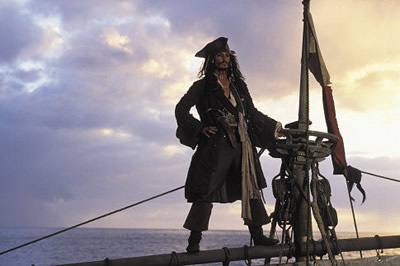
"Really
bad eggs." • From Ebert's review:
"And yet the movie made me grin at times, and savor the daffy plot,
and enjoy the way Depp and Rush fearlessly provide performances that
seem nourished by deep wells of nuttiness. Depp in particular seems
to be channeling a drunken drag queen, with his eyeliner and the way
he minces ashore and slurs his dialogue ever so insouciantly. Don't
mistake me: This is not a criticism, but admiration for his work. It
can be said that his performance is original in its every atom. There
has never been a pirate, or for that matter a human being, like this
in any other movie."
23 July 2003
— Wednesday
§
Marcel Duchamp | Avoir l'apprenti
dans le soleil / To Have the Apprentice in
the Sun | 1914
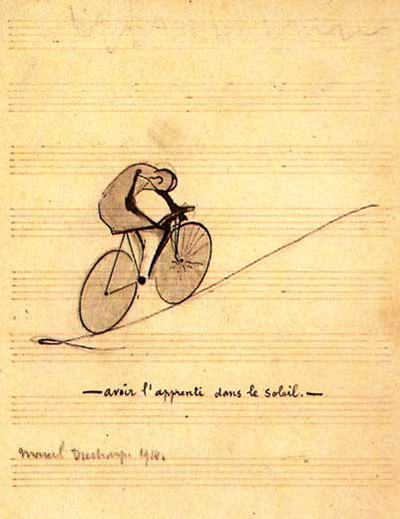
21 July 2003
— Monday
§
Björk | Volumen
| DVD | Elektra 1998
Fourteen
videos—six of them by Michel Gondry—of
songs from the solo debut through Homogenic.
Gondry's clips include "Jóga" (computer-game camera
darts, floats, and hovers over depopulated landscapes and geological
formations), "Hyperballad" (cyber-organic overlays like circuits
in compost), "Human Behavior" (children's story set with fuzzy/creepy
animal costumes and telescoping camerawork, somewhere between Siouxsie's
"Spellbound" video and Blood Simple),
"Isobel"
(b&w image floats on water in the well of an organ), and "Bachelorette"
(multiply embedded narrative frames). Among the other clips are Paul
White's "Hunter" (starkly framed face morphing into a kind
of fractal bear's head), Sophie Muller's "Venus as a Boy"
(a crush-struck Björk fries an egg in a kitchen out of Pee Wee's
Playhouse), John Kricfalusi's "I Miss You" (an archive of
animated figures including some dirtied-up Flintstones),
and Spike Jonze's "It's Oh So Quiet" (a Betty Hutton cover
turned into a tire-shop musical extravaganza worthy of Doris Day). The
conventional movie tie-in video "Play Dead" is the only one
I didn't watch to the end. | QuickTime video gallery here.
• Screen grab of Gondry's "Hyperballad" below; more grabs
available here
(choose "videostills" from nav bar at top).
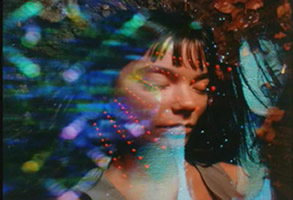
20
July 2003 — Sunday
§
À nous la liberté | Dir. by René
Clair, 1931 | DVD | Criterion 2002 | IMDb link
| DVDBreakdown link
"Clair
is also canny or prescient in linking the new capitalism with emerging
fascism throughout Europe — Emile's [phonograph] factory is ordered
on crypto-military lines, with uniforms, symbols and leader's iconography....
If Clair's politics are heavy-handed, his visual sensibility is not,
and this film transcends itself when it looses its political shackles
and gives into subversive whimsy, a rondelay of chases, fist-fights,
drunken fracas, Bunuellian iconoclasm" (Alice Liddell on IMDb).
• Lazare Meerson's incredible sets alone are worth the rental fee.
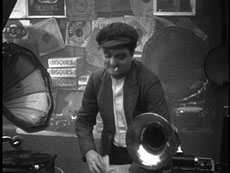
18 July 2003
— Friday
§
Marnie | Dir. Alfred Hitchock, 1964 | VHS
Though
I've probably seen this film a half-dozen times over the years, my impression
of it has always remained a bit out-of-focus and ambivalent. Watching
it again last night with greater admiration than before, I was especially
struck by 'Tippi' Hedren's disciplined handling of a role that requires
her to move from blank and irremediably broken to flipped out frigidity
to case-the-joint klepto, with scarcely a "likable" moment
to be found anywhere. (What's in it for Sean Connery's character is
one of the film's more interesting questions.) Beyond adding a new connotative
level to the title of Radiohead's recent single, the phrase "There...there,
now" fuses with astonishing concision the putting-to-death of a
beloved horse and the originary act of violence worked out in the film's
final scenes. | The Internet Movie Database (IMDb)
Photogallery for the film, from which the still below is taken, can
be accessed directly here.
The way that hairdo lifts from the forehead could no doubt sustain serious
semiotic analysis....
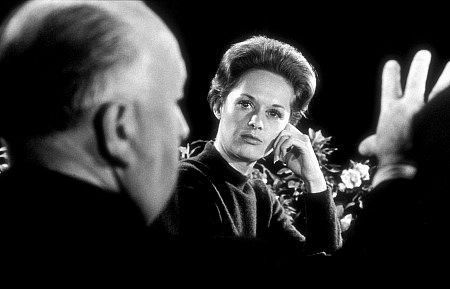
17 July 2003
— Thursday
§
Laurel Canyon | Dir. Lisa Cholodenko, 2002 | DVD
As Roger
Ebert
puts it: "Laurel Canyon is not a successful
movie—it's too stilted and pre-programmed to come alive—but
in the center of it McDormand occupies a place for her character and
makes that place into a brilliant movie of its own. There is nothing
wrong with who she is and what she does, although all around her actors
are cracking up in strangely written roles." • There's an
AC/DC tee shirt that probably deserved an acting credit of its own,
though the still below (from IMBd)
commemorates another of the acts that occupied young minds in 1979.
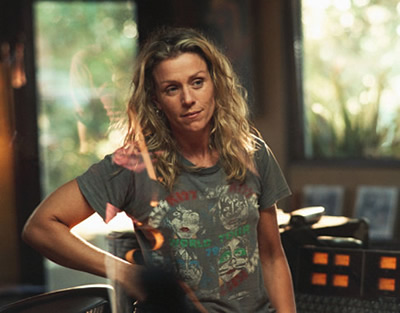
16 July 2003
— Wednesday
§
"These
Weapons of Mass Destruction Cannot Be Displayed" | Google
result for search term "Weapons of Mass Destruction" when the
"I'm Feeling Lucky" button is clicked |
direct link here,
but beware annoying pop-unders
§
New York Times | 16 July 2003 | link
requires registration
The vast
budget deficit projected for 2003: $455b, which is $150b more
than was estimated even five months ago. Charles B. Rangel comments:
"Sept. 11 didn't give us that deficit. The poor people didn't give
us that deficit. The deficit is the result mainly of massive, irresponsible
tax cuts for the richest Americans and the lack of any real plan to
boost the economy and put people back to work" (A1+). • Neela
Banerjee writes about how "Rape (and Silence About It) Haunts
Baghdad": "Shame and fear compel the lies [physicians
often hear], Dr. Younis said. 'A woman's father or brother, they feel
it is their duty to kill her' if she has been raped. 'It is the tribal
law. They will get only six months in prison and then they are out'"
(A1+). • "If an Iraqi woman wants
to report a rape, she has to travel a bureaucratic odyssey. She first
has to go to the police for documents that permit her to get a forensic
test. That test is performed only at the city morgue. The police take
a picture of the victim and stamp it, and then stamp her arm: 'That
is so no one else goes in her place and says that she was raped, that
she lost her virginity,' said Ms. Hussein, the nurse. ¶ At the
morgue, a committee of three male doctors performs a gynecological examination
on the victim to determine if there was sexual abuse. The doctors are
available only from 8:30am to 1:30pm. If a victim arrives at any other
time, she has to return the next day, without washing away any physical
evidence" (A1+). • Alissa Quart, a poet better known
for her recent book Branded: The Buying and Selling
of Teenagers, points to the commercialization of the school system
in her guest editorial "Welcome to (Company Name Here) High™":
"Parents and teachers need to work toward further measures aimed
at taking commercialism out of schools, including banning advertisements
on book covers and on hallway posters. Schools also need to abandon
the practice of awarding their naming rights to companies: if you think
selling candy bars and sodas at school is a problem, you can agree that
children identifying their schools with a supermarket chain or a paint
company isn't so healthy, either" (A21). • In Lawrence van
Gelder's "Arts Briefing," notice that the ashes of Herbert
Marcuse will be placed in an "honorary grave site next to the
great German philosopher Georg Wilhelm Friedrich Hegel"
after twenty-four years in the United States. Marcuse was born in Berlin
in 1898 and died a U.S. citizen while visiting West Berlin in 1979.
"His wife, Ricky, had him cremated in Austria and sent his ashes
to the United States because she 'felt that enough Jews had been reduced
to ashes in Germany,' his grandson Harold Marcuse explained on Marcuse's
Web site" (B2). • Also,
Billy Collins is shortlisted for the $16,000 Forward Prize, "billed
as Britain's richest annual poetry award." Other nominees: Ciaran
Carson, Ian Duhig, Lavinia Greenlaw, and Paul Muldoon (B2). See below:
§
John Greening | "The Poet Takes a Morning Off"
| Rev. of Nine Horses by Billy Collins
| Times Literary
Supplement 5230 | 27 June 2003 | 30
"Reading
Billy Collins in time of war simply highlighted his poetry's bland indifference
to any wider, deeper cultural and historical context." • "[P]oetry
of quiet personal insight has no excuse for being vapid and colourless.
It is sad to have work like this celebrated, while such essential American
poets as David Wagoner, Rachel Hadas, Emily Grosholz, Peter Kane Dufault,
and Hayden Carruth remain barely known in the United Kingdom."
§
Roger Caldwell | "At a Suitable Distance"
| Rev. of Never by Jorie Graham | Times
Literary Supplement 5230 | 27 June 2003 | 30
"Her
intellectual range is wide, but there is little sense of the philosophical
rigour that some have over-generously attributed to her work. She makes
great use of scienfitic lexis—atoms and vectors and infinitesimals—but
with no great precision of reference. There are lines which neither
make much sense nor seem distinguished as poetry (it is hard to know
what to make, for example, of 'O sweet conversation: protozoa, air:
how long have you been speaking?')." • On the other hand:
"There is a bouyancy in Graham's poetry, a freshness of vision
which is rare in contemporary poetry. With her abundance of present
participles and her indefinitely extended syntax she is very much the
poet of the felt moment and pregnant with possibility. For this, it
is possible to forgive many of her obscurities and obfuscations."
|


